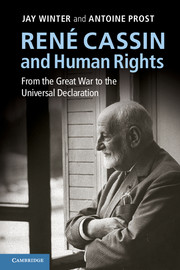Book contents
- Frontmatter
- Contents
- List of plates
- Preface and Acknowledgments
- Introduction to the English edition
- List of Abbreviations
- Part I In the shadow of the Great War
- 1 Family and education, 1887–1914
- 2 The Great War and its aftermath
- 3 Cassin in Geneva
- 4 From nightmare to reality, 1936–1940
- Part II The jurist of Free France
- Part III The struggle for human rights
- Index
- Plate section
- References
4 - From nightmare to reality, 1936–1940
Published online by Cambridge University Press: 05 April 2013
- Frontmatter
- Contents
- List of plates
- Preface and Acknowledgments
- Introduction to the English edition
- List of Abbreviations
- Part I In the shadow of the Great War
- 1 Family and education, 1887–1914
- 2 The Great War and its aftermath
- 3 Cassin in Geneva
- 4 From nightmare to reality, 1936–1940
- Part II The jurist of Free France
- Part III The struggle for human rights
- Index
- Plate section
- References
Summary
At the end of 1935, the war in Ethiopia exposed the impotence of the League of Nations. The first step the organization had taken in the 1920s towards collective security remained precisely that: only a first step. When Japan invaded Manchuria in 1931, the League condemned this action. Japan’s response was to withdraw from the League, and continue its invasion. Soon after coming to power, Hitler withdrew the German delegation from the League. Even before doing so, he had challenged the League’s claim to defend the rights of minorities within member states. In 1935, when Mussolini’s troops invaded Ethiopia, the League had no effective power to stop them. At this stage, what could Cassin point to as the fruits of the decade of effort he and others had made in Geneva and on behalf of the League and the international veterans’ movement? Was the world of Geneva a chimera, a hall of empty mirrors and empty people, as Albert Cohen famously described it?
This lamentable failure in Geneva was made even more unpalatable for Cassin by a deepening discord with his comrades in the UF, whom he represented in the League. Some veterans did not share his sense that they had to take a stand against Italy as much as against Nazi Germany. Some suspected that what was most important to Cassin was Jewish solidarity. Even without such suspicions, others wondered what had become of Cassin the pacifist. He was, to be sure, a man of compromise to a certain point, but no farther, and that point had already been reached. The majority of the UF did not share his point of view and favoured continuing a policy of rapprochement. They all hated war, but Cassin asked Pichot the decisive question: do you not see where rapprochement is leading? Would speaking directly with Hitler and Mussolini actually prevent war?
- Type
- Chapter
- Information
- René Cassin and Human RightsFrom the Great War to the Universal Declaration, pp. 80 - 106Publisher: Cambridge University PressPrint publication year: 2013

